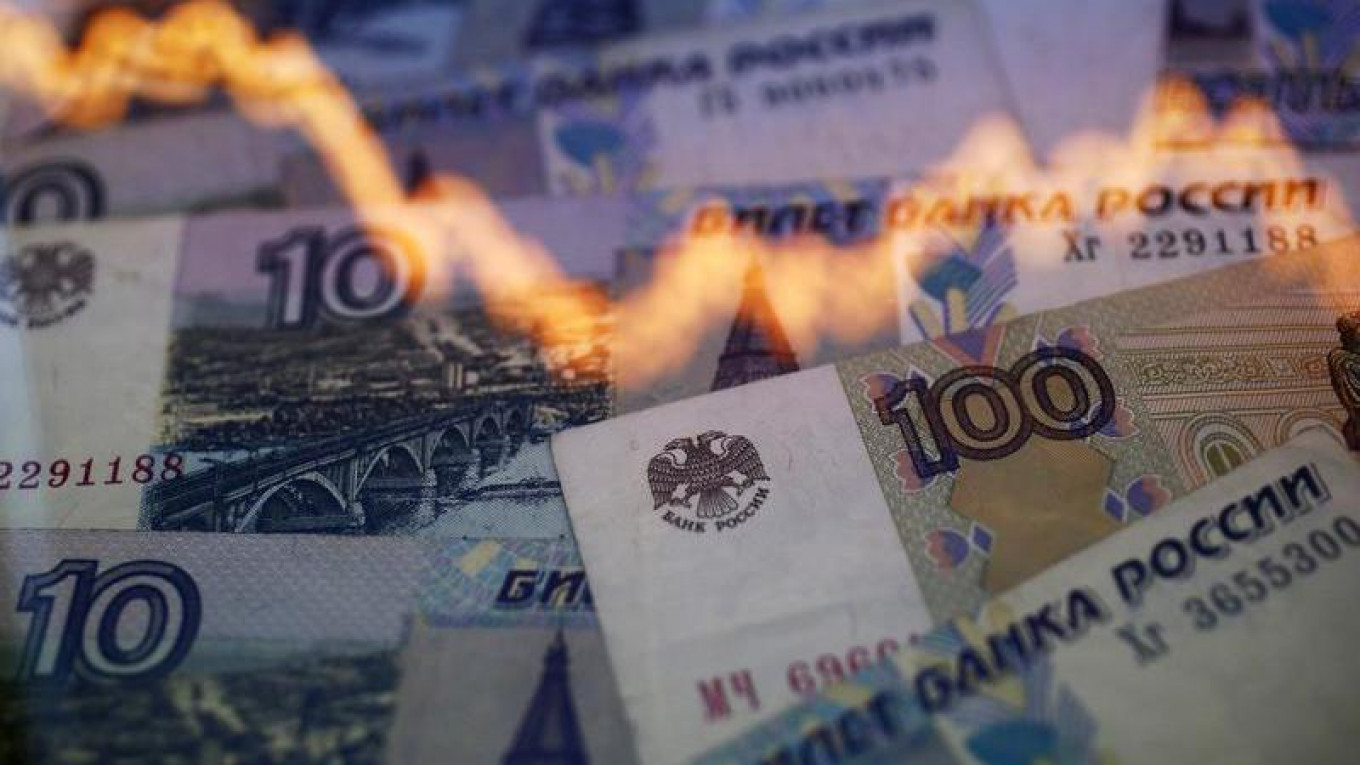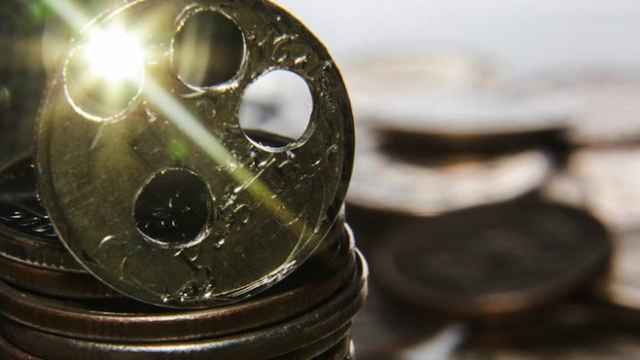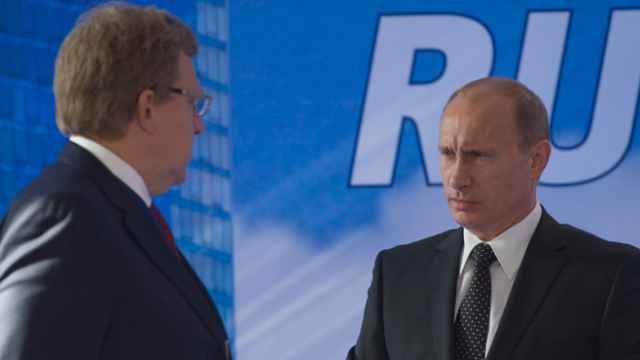Beaten by low oil prices, squeezed by sanctions, rocked by exchange rates: Russia's economy has long been feeling the strain. As austerity becomes the country's new normality, officials have even been appealing to the country's elite to lower their expectations.
“These professionals within the Garden Ring who want one hundred grand [a month] just for showing up; they should forget about it,” Alexei Ulyukayev, Russia's Economic Development Minister, warned in a recent interview. He was referring to Moscow’s large historic center, home to glittering real estate and, presumably, well-paid jobs in government and oligarchic businesses.
One hundred thousand rubles is $1,500 at today's exchange rate, whereas until mid-2014 when the post-Crimea streak of the Russian currency devaluation began, it would have been upwards of $3,000. “We need to prepare for the worst scenario, we need to live according to our means,” Prime Minister Dmitry Medvedev said at an economic conference in January.
Russian economic officials seem to be working to instill a sense of quiet resignation in the population. They readily admit the economy is not in good shape and promise nothing. They habitually talk expectations down, not up. Their favorite debate subject is whether the recession has bottomed out. Their favorite expression is “the new normal” of lower oil prices and sluggish growth.
Minister of Finance Anton Siluanov, the main proponent of nation-wide belt-tightening, managed to turn his warnings on the dangers of excess spending into an actual freeze on federal public expenditure. Spending has been capped in nominal terms (15.78 trillion rubles, $246 billion a year), which means massive cuts in real terms for some select areas. Sports and the social-economic development of the Far East, the Baikal region, and Crimea are all set to suffer most. The Finance Ministry forecasts a deficit of 3.2 percent of GDP in 2017 and plans to reduce it by 1.1 percent annually thereafter.
Yet Russia’s monetary policies are choking growth. Russian real interest rates, at 5.5 percent, are the second-highest in the world, Sberbank CIB said in a recent report.
Moscow’s economic humility is striking against the background of its upbeat rhetoric on geopolitics. The difference is so stark that the administration has even attracted praise from unlikely quarters of the international investment elite. “Putin has been playing a surprisingly quiet and effective game of defense on the economic front,” Ruchir Sharma, chief strategist at Morgan Stanley, wrote in the Financial Times. “It is a measure of the new sobriety in Moscow that senior aides to Putin seem to understand their predicament. They note that Russian growth started falling long before oil prices did, so the problem is not just oil. They do not dispute consensus forecasts showing that the economy will not grow by more than two percent in coming years.”
Spending restraint and managing expectations are wise policies, and in themselves a sign of some lessons learned. Yet something is still missing. The devaluation of the ruble has not seemed to help kick-start the economy. Four-fifths of all manufacturing sectors are still in decline. Overall manufacturing was down 4.2 percent between December 2014, when the current recession hit, and June 2016. Car manufacturing, the exemplar of decline, decreased by 30 percent during the same period. Currency devaluation usually attracts foreign investment, but the opposite has been happening in Russia. Foreign investment shrunk almost 10 times from $60 billion in 2013 to just $6.5 billion in the first half of 2016, sanctions obviously being one of the reasons. Domestic investment started declining even before Russia annexed Crimea and is still going down, indicating major distrust in market conditions and government policies.
What is conspicuous by its absence is a clear forward-looking development plan, or indeed any plan at all. Many in Russia tend to think that Alexei Kudrin, former Finance Minister and Vice-Premier was responsible for developing an economic vision. Earlier this year, Kudrin ended his four-year stint as a civil-society figure and accepted a Kremlin invitation to lead a panel of experts tasked with mapping Russia’s economic future. Kudrin believes in private-sector driven growth, which means creating a stable institutional framework and establishing an attractive investment climate. This is why Kudrin suggested in June that toning down Russia’s assertive foreign-policy posture would help bring in some badly needed investment. Putin retorted by saying that “Russia’s sovereignty was not for sale.”
One way to read this remark is to infer that only complete sellouts are nice to foreign investors. Another reading suggests that Kudrin apparently was wrong to believe that he had been made a “member of the Politburo” again. Putin loves to emphasize the formal rules of the game (rules of his game, of course): Kudrin was accepted back into the fold as an expert on the economy, not on Russia’s foreign policy. Putin soon humiliated Kudrin even further by announcing that an alternative strategy would be developed by a group of economists led by the Business Ombudsman Boris Titov who backs “quantitative easing, Russian-style.” These economists and businessmen propose a 1.5-trillion-ruble ($22.5 billion) annual stimulus plan.
The difference between the two strategies is fundamental. Kudrin’s formula is “business environment first, private investment later,” while his opponents want “public investment first, business environment later or never.” The two visions cancel each other out and this is exactly what Vladimir Putin seems to like about it. Both projects emphasize domestic growth based on either private initiative (Kudrin) or public spending (Titov). The first path means backpedaling on aggressive foreign-policy projects and depends on reviving and empowering the urban middle class. This poses a problem however, since the Kremlin is convinced that professionals who are paid more than $1,500 a month are a potential threat as proved by the protest movement of 2011-2012. The second path, exemplified by large public-works projects, will inevitably lead to even more corruption than currently exists in Russia.
The Kremlin favors none of the suggested cures to the current
economic malaise. A managed stalemate seems to be a better solution
than potentially disruptive growth. There exists an additional
dimension to the kind of economic prudence Ruchir Sharma liked so
much. We are not witnessing a failure to come up with a meaningful
growth plan, but a deliberate policy of restrained growth. The
Kremlin does not want to achieve economic growth by any means that
would require softening its foreign policy stance, empowering the
middle class, or unleashing a spending spree. In practical terms,
this means a rejection of growth that is not commodities driven. This
latter path seems safe enough for them.
Maxim
Trudolyubov is a Senior Fellow with the Kennan Institute and
editor-at-large with Vedomosti.
This
piece was originally published on The Russia File: A
Kennan Institute Blog.
A Message from The Moscow Times:
Dear readers,
We are facing unprecedented challenges. Russia's Prosecutor General's Office has designated The Moscow Times as an "undesirable" organization, criminalizing our work and putting our staff at risk of prosecution. This follows our earlier unjust labeling as a "foreign agent."
These actions are direct attempts to silence independent journalism in Russia. The authorities claim our work "discredits the decisions of the Russian leadership." We see things differently: we strive to provide accurate, unbiased reporting on Russia.
We, the journalists of The Moscow Times, refuse to be silenced. But to continue our work, we need your help.
Your support, no matter how small, makes a world of difference. If you can, please support us monthly starting from just $2. It's quick to set up, and every contribution makes a significant impact.
By supporting The Moscow Times, you're defending open, independent journalism in the face of repression. Thank you for standing with us.
Remind me later.








